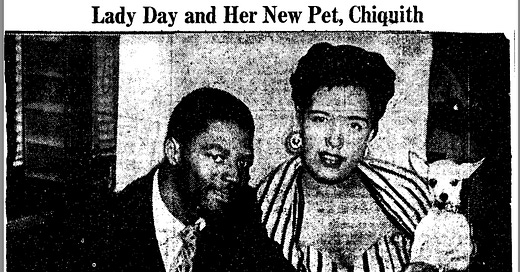I’ve already posted 15 essays with all-new information about Billie Holiday. And I’ve got plenty more research on her that I’ll be posting. For today, here’s an article about Holiday that I’ve never seen quoted anywhere. It’s easy to miss, because Holiday’s name is not in the headline. And it’s not really an interview, but rather a report of a brief and informal conversation that the author had with her. The article was published on August 12, 1950, in the Afro-American, an important weekly Black newspaper that is still published in Baltimore. There is also a Washington, D.C. edition, and at that time there were editions published in Philadelphia and other areas, each one with added pages of local news. In fact the author of this piece, Samuel Hoskins, was the manager-editor of the New Jersey edition, which had started around 1940. He also reported news, and wrote a column on occasion with the heading Along Reporter’s Row. Billie’s name is only in the sub-heading.
Hoskins had gone to see Holiday perform at the Piccadilly Club in Newark, New Jersey. (There was another club only half a mile away called simply The Piccadilly, where young Sarah Vaughan had performed.) He begins by talking with Larry Bennett, who worked for Joe Glaser at the Associated Booking Corporation and had set up this gig for Billie. As you’ll see, Hoskins does most of the talking:
Why didn’t Billie answer his question? Well, I can think of two reasons. One is that it’s never a good idea to give someone a lecture before you ask them a question. His long preface to the question might have turned her off. The second reason is, how could one answer that question, other than simply saying ”Each singer has her or her own style”? And that’s so obvious that it’s hardly worth saying.
In comparing “Deep Song’ with “Strange Fruit,” Holiday is noting something of which few today are aware: “Strange Fruit” sold so well that, far from avoiding or suppressing it, the recording companies were looking for more songs in the same genre. Even Columbia Records, which had turned down “Strange Fruit,” was now looking for similar songs. But—this is the key—what they considered to be similar was not political protest songs, but rather “strange, moody, haunting songs.” I specifically mentioned “Deep Song” as one of the numbers that label executives, in this case at Decca, hoped would become a hit like “Strange Fruit.” Recorded by Holiday in February 1947, this was written by George Cory and Douglass Cross. (Jazz historian and subscriber Bill Kirchner reminds me that they later wrote “I Left My Heart in San Francisco.”) Let’s listen to it now:
The next week, on August 19, 1950, the Afro-American published a photo that goes with the article above. Here is Billie with her dog, and “bandleader” Willie Cook, who is mentioned in the article. This is the well-known trumpeter. At that time Cook had left Dizzy Gillespie’s band and had not yet joined Ellington’s, and he was leading the band that accompanied Billie (as confirmed years later in an interview in Sweden with Göran Wallen):
More to come on Billie Holiday, and others!
All the best,
Lewis





“…strange, moody, haunting songs.” (Which do not mention lynching)
Hey Lewis, once again great research shared with clarity and compassion.
Thanks Boss!!!